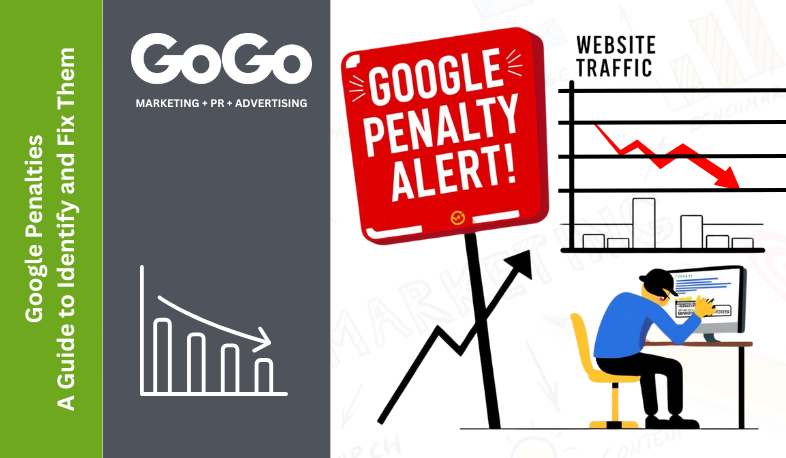Google penalties have long been a major concern for business owners, website owners and SEO professionals. These penalties, issued for violating Google’s webmaster guidelines, can dramatically impact search rankings, traffic, and revenue. In 2025, as search algorithms evolve and enforcement becomes stricter, penalties remain a significant risk. This guide explores the current state of Google penalties, their impact, and how to handle them.
What Happens When You Get a Google Penalty?
A penalty can require you to:
- Remove or disavow bad backlinks
- Eliminate hidden text
- Correct improper redirects
- Address user-generated spam
- Modify or remove problematic content
While a Google penalty won’t ruin your site permanently, it can lead to a significant drop in rankings and traffic. If your organic visibility is a major source of business, even a temporary setback can be costly.
Types of Google Penalties
Google penalties fall into two categories:
- Manual Penalties – Issued by a Google reviewer, often for unnatural backlinks, thin content, or cloaking. Notifications appear in Google Search Console.
- Algorithmic Penalties – Triggered automatically when Google detects issues like keyword stuffing, duplicate content, or spammy backlinks. These penalties are harder to identify since they are not explicitly flagged.
Do Google Penalties Still Exist in 2025?
Yes, Google penalties remain in effect, and their enforcement has become more sophisticated. Key developments include:
- Stronger Emphasis on E-E-A-T: Google now prioritises Experience, Expertise, Authoritativeness, and Trustworthiness (E-E-A-T) across all industries..
- Automated Penalty Systems: Google’s AI-driven algorithms detect violations faster, reducing reliance on human intervention. Algorithmic penalties for spammy backlinks, for instance, can occur within days.
- Crackdown on AI-Generated Content: Google has enhanced its ability to detect and penalise low-quality AI-generated content, requiring websites to ensure AI content is original and valuable.
- Real-Time Algorithm Updates: Frequent, real-time updates mean penalties can be applied instantly, as opposed to the periodic updates of previous years.
12 Common Reasons for a Google Penalty
If you’re wondering, “What did I do wrong?”—don’t worry, you’re not alone. SEO professionals often have to diagnose penalty issues. Here are some of the most common causes:
- Algorithmic Changes – Google updates its algorithms regularly, which can impact entire industries.
- Cloaking – Showing different content to users than to search engines.
- Malicious Pages – Hosting pages with pop-ups, forced downloads, or browser hijacks.
- Sketchy Affiliate Links – Hosting low-quality, spammy affiliate links.
- Doorway Pages – Creating multiple similar pages to rank for the same keywords.
- Hacked Website – If your site gets hacked, Google may flag it as unsafe.
- Hidden Text and Links – Using invisible keywords or links to manipulate rankings.
- Keyword Stuffing – Overloading a page with repetitive keywords.
- Paid Links – Buying links instead of earning them organically.
- Scraped Content – Copying content from other websites instead of creating unique content.
- Thin Content – Pages that add little or no value to users.
- Unnatural Links – Spammy links within blog comments or user profiles.
How to Identify a Google Penalty
If your website’s traffic or rankings drop suddenly, you might be dealing with a penalty. Here’s how to investigate:
- Check Google Search Console: Look for manual action notifications under the ‘Security and Manual Actions’ tab. If you don’t have one ask us , we can help you create one.
- Analyse Traffic Patterns: Compare traffic drops.
- Audit Your Backlinks: Identify unnatural or spammy links pointing to your site.
- Evaluate Content Quality: Assess your pages for duplicate content, keyword stuffing, or low-quality material.
What to Do if You Encounter a Google Penalty
Recovering from a Google penalty requires a systematic approach. Here are the steps to follow:
Identify the Cause
Determine whether the penalty is manual or algorithmic. This will guide your recovery strategy.
Address Manual Penalties:
- Follow instructions in Google Search Console.
- Remove or disavow spammy backlinks using the Disavow Tool.
- Fix any content issues flagged in the notification.
- Submit a reconsideration request once the issues are resolved.
Recover from Algorithmic Penalties:
- Audit your site for thin or duplicated content and replace it with high-quality material.
- Ensure your site meets E-E-A-T guidelines by improving trust signals (e.g., author bios).
- Remove or disavow harmful backlinks and focus on earning high-quality links.
- Monitor performance closely, as real-time updates mean recovery could be faster than in previous years.
Monitor Progress:
Continuously track rankings, traffic, and Search Console messages to ensure the penalty is resolved.
How to Avoid Google Penalties
Prevention is always better than cure. Here’s how to safeguard your website from penalties:
- Follow Google’s Guidelines: Familiarise yourself with and adhere to Google’s Webmaster Guidelines.
- Focus on High-Quality Content: Prioritise user-focused content that meets E-E-A-T standards. Ensure all material is original, well-researched, and valuable.
- Audit Regularly: Perform regular site audits to identify potential issues with backlinks, content, or technical SEO.
- Avoid Black Hat Tactics: Techniques like keyword stuffing, cloaking, and link schemes might provide short-term gains but almost always result in long-term damage.
- Monitor Backlinks: Use tools like Google Search Console to track inbound links and disavow harmful ones promptly.
Google penalties remain a critical part of SEO in 2025. Businesses must stay informed, follow best practices, and act quickly if penalised to protect their traffic, revenue, and credibility.
Need Help Recovering from a Google Penalty?
If your site has been penalised, don’t panic. The best way to fix or avoid Google penalties is to work with experienced SEO professionals. At GoGo Marketing, we specialise in penalty recovery and proactive SEO strategies. Contact us today to restore your rankings and protect your site’s future.







